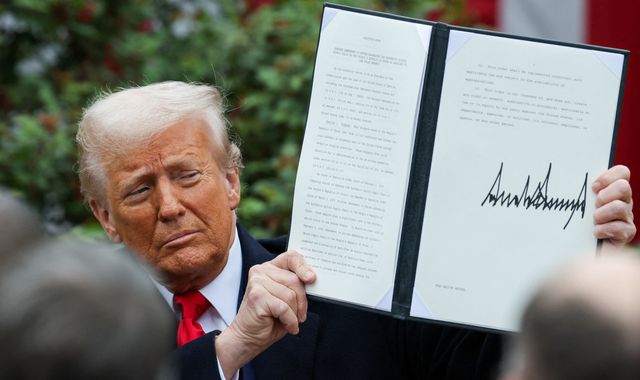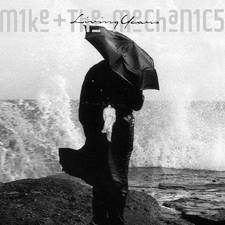What Sky correspondents make of Trump's tariff announcement
2 April 2025, 21:08 | Updated: 3 April 2025, 08:15

Donald Trump has announced new tariffs he is slapping on countries around the world on what he declared as "Liberation Day".
The president said at the White House that there would be a 10% baseline tax on imports from all nations and higher rates on goods from dozens of countries that run trade surpluses with the US.
Mr Trump held up a chart in the Rose Garden, showing the US would charge a 34% tax on imports from China, a 20% tax on imports from the EU, 25% on South Korea, 24% on Japan, and 32% on Taiwan.
The UK seemed to get off more tightly, with a 10% tariff.
Latest updates on Trump tariffs
So what do Sky's correspondents think of the president's tariff announcement?
David Blevins, Sky correspondent, in Washington DC
Donald Trump has left little ground for negotiation.
By declaring a national emergency due to national security and economic concerns arising from the trade deficit, the president has given himself the power to regulate imports.
He is regulating them by imposing a 10% baseline tariff on all countries exporting goods to the United States, and country-specific tariffs on the 60 "worst offenders".
The UK has escaped that worst offenders list with a 10% tariff, but the EU has not - a tax of 20% now imposed on its products.
But Trump stressed that those specific reciprocal tariffs are half what those "worst offending" countries charge the United States.
The combination of declaring a national emergency and framing the president as "lenient" and "kind" limits the ability of those on the receiving end to negotiate.
One senior White House source said: "This is not a negotiation. It's a national emergency.
"And any country that thinks that they can simply make an announcement promising to lower some tariffs is ignoring the big, central problem of their massive non-tariff barriers and the institutionalisation in their trade model."
Helen-Ann Smith, Asia correspondent, in Beijing
China was expecting further tariffs and it will have been preparing, but no degree of preparation could effectively counter the immediate impact this latest round of tariffs will have on China's economy.
Once you add together tariffs levied earlier this year to those still in place from Trump's first term, all Chinese goods will now face import taxes of over 50%, some potentially as high as 70%.
Such levels realistically render trade with America all but impossible for the vast majority of businesses.
Given exports account for 20% of China's entire economy and trade with America makes up about 15% the impact will be huge and wide reaching.
Experts are already predicting job losses could be in the millions, swathes of small businesses that populate China's complex supply chains could go under and there is a high chance China's growth target of around 5% will be missed.
For a country already grappling with a slowing economy and high unemployment it all amounts to a serious challenge.
There's a sense people have been particularly caught off guard by the targeting of other smaller southeast Asian economies.
Reciprocal tariffs of 46% of Vietnam , 49% on Cambodia and 36% of Thailand are not only catastrophic for those lower income economies , but they also put a hard road block on an increasing trend of Chinese companies relocating to avoid tariffs - even work-arounds are now not an option.
The impact on Asia as a broader region was reflected in the markets, lower on opening and a significant slide in the futures trading. Leading regional economies Japan, South Korea and Indonesia have also taken big hits.
There will almost certainly be frenetic negotiations underway behind the scenes, but China will absolutely need to be seen to respond, the ministry for commerce has already said as much in a statement.
The question is when and how far will it go. Authorities here can ill afford further escalation, but will not want to be seen to be bullied.
Beth Rigby, political editor, in Westminster
It has been quite a rollercoaster for the government, where they went from the hope that they could avoid tariffs, that they could get that economic deal, to the realisation that was not going to happen, and then the anticipation of how hard would the UK be hit.
In Westminster on Wednesday night, there was actual relief because the UK is going to have a 10% baseline tariff - but that is the least onerous of all the tariffs we saw President Trump announce.
He held up a chart of the worst offenders, and the UK was well at the bottom of that list.
Number 10 sources were telling me as President Trump was in the Rose Garden that while no tariffs are good, and it's not what they want, the fact the UK has tariffs that are lower than others vindicates their approach.
They say it's important because the difference between a 20% tariff and a 10% tariff is thousands of jobs.
Where to next? Number 10 says it will "keep negotiating, keep cool and calm", and reiterated Sir Keir Starmer's desire to "negotiate a sustainable trade deal".
"Of course want to get tariffs lowered. Tomorrow we will continue with that work," a source added.
Another source said the 10% tariff shows that "the UK is in the friendlies club, as much as that is worth anything".
People will be number-crunching, trying to work out what it means for the UK. There is a 25% tariff on cars which could hit billions in UK exports, in addition to the blanket 10% tariff.
But despite this being lower than many other countries, GDP will take a hit, with forecasts being downgraded probably as we speak.
I think the government's approach will be to not retaliate and try to speed up that economic deal in the hope that they can lower the tariffs even further.
There will be concessions. For example, the UK could lower the Digital Services Tax, which is imposed on the UK profits of tech giants. Will they loosen regulation on social media companies or agricultural products?
But for now, there is relief the UK has not been hit as hard as many others.
Dan Whitehead, Sky correspondent, in Toronto, Canada
For Canada - this is all about cars.
Confirmation from President Trump that from Thursday, vehicles imported into the US will, as feared, be subject to a 25% tariff.
It is a bitter blow to the car makers - mainly in Ontario - but such is the integration of the auto industry in North America that it is bad news too for the industry in the US.
"He will single-handedly shut down the American auto industry," claims Flavio Volpe, head of Canada's Automotive Parts Manufacturers Association.
He told Sky News this tariff will lead to mass job losses among the 500,000 car workers in Canada within "one week".
More than a million vehicles are exported from Canada to the US each year - an industry worth tens of billions of dollars.
Even though there's not yet a specific tariff on auto parts, companies in Canada are already cutting staff and losing business; fewer car orders, fewer parts needed.
Canada may not have been on the billboard of highest tariff countries, but they are left in limbo that things could get worse if it doesn't address what Trump sees as a "massive" amount of fentanyl coming across the border.
Such is the turmoil between Canada and the US, that the new Canadian Prime Minister Mark Carney called a snap election for 28 April.
The US-Canada relationship is "no longer" reliable, he says - just how these North American neighbours fix it will be front and centre when Canadians head to the polls.
Adam Parsons, Europe correspondent, in Brussels
There will be a response from the European Union - the question is how soon, and how tough.
A symbolic reprisal is one choice - putting tariffs on classic American products such as Harley-Davidson motorbikes or bottles of bourbon. That won't damage the European economy, but it won't make much of a difference, either.
There's a reluctance to slap wide-ranging, indiscriminate tariffs simply because that would increase costs for many European manufacturers. So something more targeted may look appealing and that could mean going after the tech giants - Facebook, Apple, Google, Amazon, for example.
Companies who have already had rows with EU regulators and are seen as being, to varying extents, close to the White House. If Europe could specifically target Tesla, it probably would.
There are also those suggesting the EU should hold fire for the moment, confident that Trump's tariffs will backfire and keen that the effects are visible.
One fear is that some of the cheap goods that were destined for US markets will now be diverted to Europe, flooding its market. Another fear is how the Windsor Framework will be affected, now that there are different US tariffs on either side of the Irish border.
And finally there is that insult from the president, who called the European Union "pathetic". A few minutes later, a senior EU diplomat sent me a message saying "the US is Brexiting the world, but you can't stop the march of folly".
Transatlantic relations are getting even icier.
Neville Lazarus, India producer in New Delhi
President Trump slapped a 26% tariff on India, calling it a discounted rate against an average 52% duty on American products.
The Indian commerce ministry has said the new policy is a mixed bag and not a setback for the country. They are still analysing the impact it will have on domestic exporters.
President Trump has often labelled India as "tariff king" and a big abuser of trade ties. He shared a report of the US Trade Department which stated Indian tariffs on agricultural products are one of the highest in the world, averaging 113 %.
America is India's largest trading partner, with bilateral trade of about $130bn in 2024, but there is a trade deficit of $46bn in India's favour.
The new policy will mainly impact agricultural products, automobile parts, textiles, gems and jewellery.
A key sector left untouched is pharmaceuticals. India is one of the largest exporters to the US and supplies nearly 47% of all generic pharmaceuticals to American patients.
The Indian government has taken steps to win over Trump by lowering tariffs on motorcycles, bourbon and digital services for US tech giants - but the president wants more done.
A bilateral trade agreement is being negotiated between the two countries, which could provide India relief in the future.
The effects of the new policy have been felt in this morning's trading, with a drop in the Indian stock market and Sensex when it opened.
Connor Gilles, Scotland correspondent in Glasgow
The US is the most important foreign drinks market for the Scotch whisky industry.
Whisky is Scotland's biggest export, with £5.4bn worth sold overseas last year.
Geopolitical trade tensions may feel far away from the tiny distilleries in the hills and glens of Scotland where Scotch is produced, but 132 million bottles went to America last year - worth almost £1bn alone.
Insiders were glued to their screens at 9pm on Thursday for the grand unveiling of Mr Trump's chart at the White House.
They squinted their eyes as they scanned the board to spot "United Kingdom - 10%". And with that they knew they were in line to lose millions.
The industry was bruised by Mr Trump's first presidency. A 25% tariff on single malt Scotch was levied for 18 months from 2019 to 2021 and cost the equivalent of over £1m a day.
They are now well acquainted with unpredictable tariffs, and some feel this 10% levy may be slightly more manageable than the scenario facing colleagues is the EU.
Chancellor Rachel Reeves previously promised to make the case that Scotch whisky should be spared from tariffs.
A lot is riding on the hope that this Labour government can turn the talk of a trade deal in to reality.
(c) Sky News 2025: What Sky correspondents make of Trump's tariff announcement





















